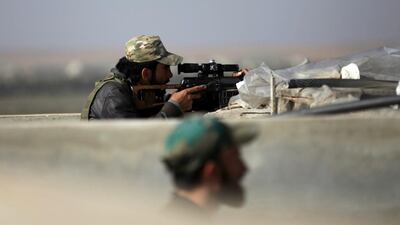By the end of this year, the Syrian rebels will probably lose control of all the major population areas they currently hold. The insurgency might resemble the state it was in before the summer of 2012, when the rebels contested and did not hold populous strongholds.
The problem for the opposition is that the realities today are different from those in 2012. The rebels’ most committed backers are largely out of the picture. The regime’s sponsors increasingly dictate the rules and the rise of the war’s “third forces” – from ISIL and Al Qaeda to the Kurdish militia YPG – is providing Bashar Al Assad with new opportunities.
First, consider the rebels’ performance over the past three years. They lost Raqqa, Deir Ezzor and Hasaka to ISIL and Homs and Aleppo to the regime. They expanded their territory in 2015 after a string of gains against the government forces in Idlib.
The rebels’ remaining populated strongholds, Idlib and Deraa, face uncertainty in the coming months.
In Idlib, foreign aid to the non-jihadist rebels was cut off three weeks ago after Al Qaeda launched a campaign of consolidation, which involved fighting rivals and confiscating their weapons. The purpose of the campaign by the group, now known as Hay’at Tahrir Al Sham, was to pre-empt any fighting against it and to weaken potential rivals in the only province where it holds sway.
Al Qaeda is poised to further tighten its control of Idlib at the expense of the rebels, for three reasons. Any organised effort against it from inside Idlib has become much more problematic after the group’s pre-emptive campaign, the fragmentation of the rebels there and the cessation of military support. Previously, the United States sought to separate the rebels from Al Qaeda in the north-west. The effort failed due to deep military integration and dependency between the two sides, and there is no reason to believe it is possible now.
The second factor that favours Al Qaeda’s continued consolidation is that Turkey, the most capable country to confront the group due to border proximity and its relationship with the rebels, cannot afford to divert its attention from a far more important fight. Any support for a fight between the rebels and Al Qaeda in Idlib will distract from its attempts to check the rising influence of the YPG. Indeed, pressure against the rebels in Idlib could push them to join the Turkish-backed Euphrates Shield against ISIL and the Kurds.
Third, the regime does not have the resources to launch a campaign to retake Idlib. The regime needed significant support from Hizbollah and Iran, with Russian and American air power, to retake Palmyra a week ago.
Deraa faces a unique fate. The rebels continue to control two thirds of the province, with relatively quiet frontiers except against a resurgent ISIL in the south-west. Al Qaeda is a capable force and proved able to mobilise forces against the regime in the province. Neither ISIL nor Al Qaeda is projected to become dominant players in Deraa. Instead, the military status quo in Deraa will either persist or the regime retakes key areas to secure the city centre and the border crossings near Jordan.
In either scenario, Deraa will cease to be a viable stronghold for challenging the regime. Which brings us to how the regime will benefit, more than how the opposition suffers, as the rebels lose control of major strongholds. This year might be when the regime reaps the benefit of the rise of the “third forces” in the war.
In 2014, ISIL cleared the rebels from nearly 50 per cent of the country. Unless the rebels liberate those areas from ISIL, the regime stands to benefit. In much of this terrain, pragmatic forces friendly to the regime have a growing influence. Those forces are not restricted to the Kurdish-dominated Syrian Democratic Forces. They also include tribal militias from eastern and northern Syria that were once part of the Syrian opposition.
In other words, some of the areas seized by ISIL were subtracted from the opposition in 2014 and are now added to the regime in one form or another. The so-called third forces have indirectly done the bidding of the regime, either by dislodging the rebels or by being pragmatic forces willing to cooperate with the regime or at least to not fight it.
Examples of the shifting game abound. The SDF in Manbij, for example, ceded villages west of Manbij to create a buffer zone between them and the Turkish-backed rebels. The Turkish prime minister, Binali Yildirim, stated that Turkey would prefer the Assad regime control Manbij rather than the Kurds. The US air force helped the regime expel ISIL from Palmyra.
Some rebel groups have also stated they are willing to cooperate with the Russians if Moscow proved a fair interlocutor in the conflict. There is also an initiative by opposition members from Deraa to reach a deal with the regime in exchange for local powers, akin to the Kurds in the north. Jordan’s chief of staff told the BBC in December that Amman was prepared to re-open the border only if the regime controlled the border areas.
The opposition’s backers, such as Turkey and most of the Gulf states, have changed their priorities in the conflict. Countries such as Qatar have little room to back groups they previously backed in the same way since such support will have to go through countries such as Jordan and Turkey. With backers either changing priorities, exiting the conflict or being locked out of it, the rebels will find themselves in the most critical situation they have faced since the beginning of the uprising if, or when, they lose hold of their major strongholds.
Hassan Hassan is a senior fellow at the Tahrir Institute for Middle East Policy and co-author of ISIS: Inside the Army of Terror
On Twitter: @hxhassan

